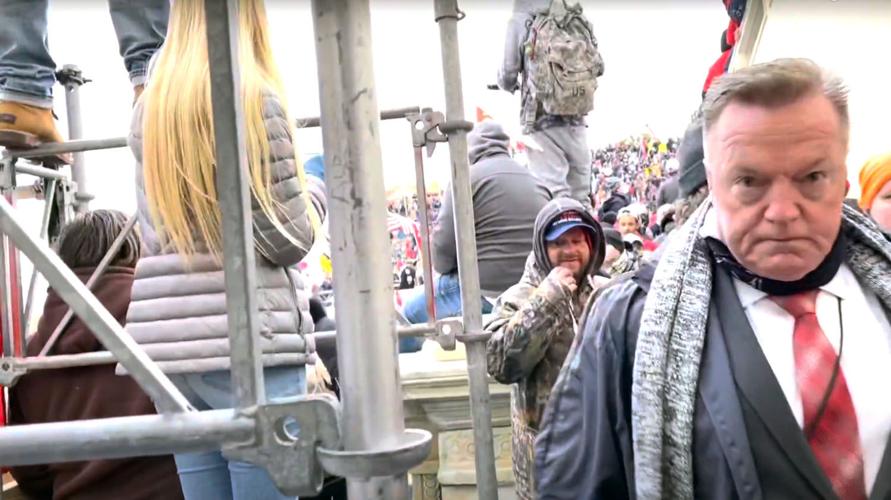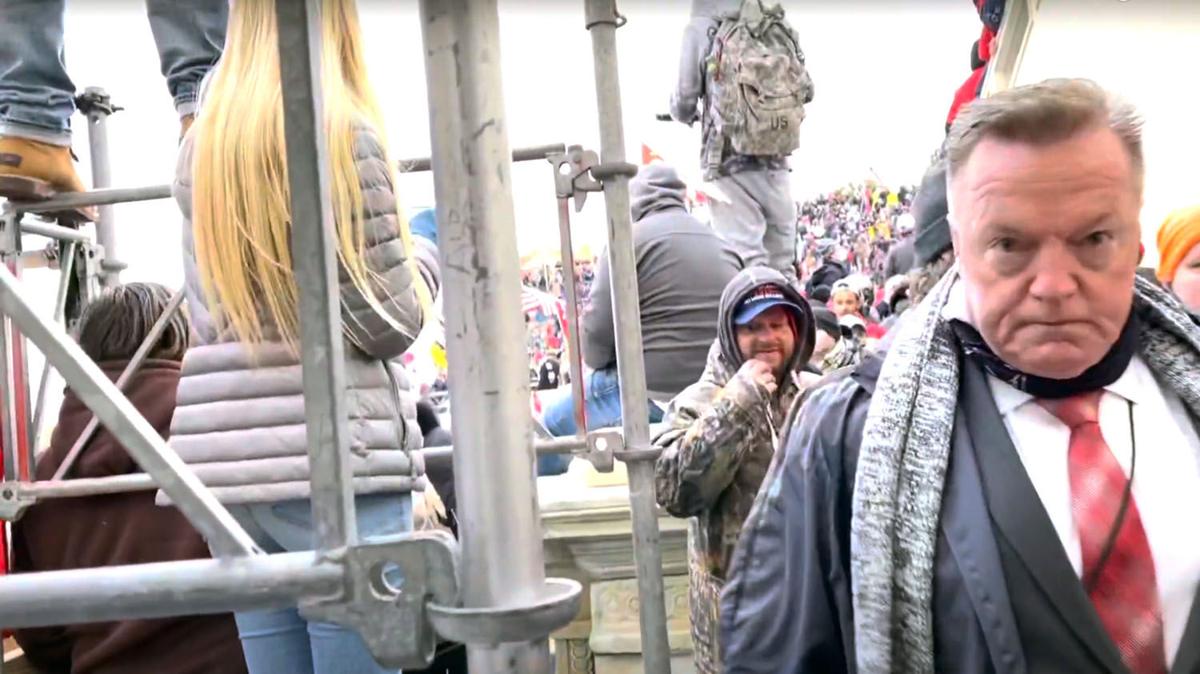PHOENIX — A state senator being investigated by Attorney General Kris Mayes for his role as a “fake elector” is now opening a legislative investigation into her.
Glendale Republican Anthony Kern said since Mayes, a Democrat, took office in January 2023 there has been “a flood of questionable activity” from her office. He said that includes a “witch hunt” against local elected officials for the votes they have taken,” an obvious reference to Mayes’ decision to prosecute two Cochise County supervisors for delaying the certification of the 2022 election results.
“I think it’s time someone took a serious look at what is going on there,” Kern said.
But this is about more than Kern himself. He got the Senate Judiciary Committee, which he chairs, to vote along party lines on Thursday to open the probe.
Kern told Capitol Media Services he did not want to talk about the issue beyond the remarks he made at the committee hearing.
But Senate Minority Leader Mitzi Epstein said it was clear to her what is happening.
“This is just a political theater,” said the Tempe Democrat, saying that Kern, a Republican candidate for Congress, presented no testimony to justify such an inquiry. “You’re just trying to stand up, make your case and create, literally, a theater for yourself.”
And in a prepared statement, Mayes herself dismissed the probe as “wasting time and taxpayer money into a baseless inquiry into how I’ve done the job.”
An aide, however, said no decision has been made how she will respond to any demands from Kern or his committee for evidence or testimony.
Kern said the problems he wants investigated start with what he said is Mayes’ decision to reverse what had been the position of the state in prior litigation.
He specifically mentioned the “Save Women’s Sports Act,” approved in 2022 by the Republican-controlled Legislature.
The statute requires public schools and any private schools that compete against them to designate their interscholastic or intramural sports strictly as male, female or coed. It specifically says that teams designed for women or girls “may not be open to students of the male sex,” with that defined as those born biologically male.
The parents of several transgender girls filed a lawsuit.
Mayes, whose office normally defends state agencies and state laws, stepped away from the case, saying her views on the issue did not align with state schools chief Tom Horne.
But that didn’t leave the state without a defense, as Horne was allowed to use state funds to hire his own lawyer. And Senate President Warren Petersen and House Speaker Ben Toma intervened with their own attorneys to defend the law.
Mayes, since taking office, also has flipped the state’s legal stance in the debate over abortion.
Mark Brnovich, her Republican predecessor, had taken the position that when the U.S. Supreme Court overturned Roe v. Wade in 2022 that freed Arizona to again start enforcing its never-repealed territorial-era law that outlaws the procedure except to save the life of the mother. Brnovich even got Pima County Superior Court Judge Kellie Johnson to agree, bringing virtually all abortions to a halt.
Mayes, however, has sided with Planned Parenthood Arizona which contends that a more recent law allowing doctors to terminate a pregnancy through 15 weeks takes precedence.
The state Court of Appeals agreed, with abortions now taking place through that cutoff. And now Mayes is working with Planned Parenthood and Pima County Attorney Laura Conover to convince the Arizona Supreme Court to uphold that ruling.
But the issue of representation isn’t Kern’s only complaint against Mayes.
He pointed out that Gov. Katie Hobbs, in a dispute with Senate Republicans over confirmation of her picks to head state agencies, withdrew all of the nominations. Instead, she used a maneuver that keeps the same people in charge, but as “deputy executive directors,” escaping Senate oversight.
Kern called that an “obvious violation of law,” saying Mayes “has provided cover” for the governor.
But an aide to Mayes confirmed that no legislator ever asked for her office to investigate.
Then there’s the “witch hunt.”
“I am not aware of a similar instance where an attorney general has threatened to criminally prosecute an elected official on the way they vote,” Kern said. “This is outrageous and it should shock and scare the citizens of Arizona.”
Mayes got an indictment last year against Cochise County supervisors Tom Crosby and Peggy Judd accusing them of conspiring to delay the formal canvass of votes from the election. The pair had balked after raising questions about the accuracy of the tallies and the machines used to count the ballot.
A separate charge says the pair illegally interfered with an election office. That is based on the delay their action caused in preventing Hobbs, who was then secretary of state, from completing the statewide canvass.
Both have pleaded innocent. A trial is set for May.
But this goes beyond Cochise County.
Mohave County Supervisor Ron Gould filed his own lawsuit last month, accusing Mayes of subjecting him to “threats and intimidation’’ for pushing for a hand count of election returns.
He contends nothing in state law precludes a county from deciding to tally ballots by hand. More the point, he claims that a majority of the five-member board would vote for such a procedure were it not for Mayes, in a November letter to the supervisors warning them that going down that path “could result in various felonies and misdemeanor penalties.
“We hope you will choose not to violate the law and thus that it will not be necessary to consider whether criminal prosecution is warranted for conducting an illegal hand count,” the attorney general wrote.
No date has been set to hear his complaint.
Gould noted, though, it hasn’t been just Mayes who has threatened litigation over the 2022 election. He said there were similar threats from Kori Lorick, the state elections director under Hobbs when she was secretary of state, to bring charges against any county that did not certify the results on time.
Epstein, in opposing the vote to open an investigation, said Kern’s proposal lacks foundation.
“The facts before us are that we have had no testimony, no warrants have been given, no foundation for why this is needed,” she said. “And therefore it appears to me to be political theater and it is not grounded in fact.”
Sen. Anna Hernandez, D-Phoenix, also voted against launching an investigation.
“I would want to hear more about why we would open this inquiry,” she said.
“There are a lot of things that happen and have happened in government that I don’t agree with and I oppose in many ways,” Hernandez said. “I don’t know if that is justification to open this inquiry into the attorney general.”
But Sen. Wendy Rogers, R-Flagstaff, said the charges that Kern laid out “are enough basis to open an inquiry.”
Kern said he didn’t need the permission of the panel, saying it is his “absolute right” as chairman of the Judiciary Committee to begin the probe. And he said there are sufficient facts to pursue the matter.
“The public has a right to hear,” Kern said.
Mayes, in her statement, said Kern should be spending his time elsewhere, saying Republicans could be “tackling the fentanyl crisis or protecting senior citizens from abuse.”
Kern is one of 11 Republicans who, despite the official returns of the 2020 election, convened at state party offices more than a month after the vote to sign a document declaring that Trump won in Arizona despite the official tally showing Joe Biden had outpolled him by 10,457 votes. And they sent that statement to the National Archives to declare that Trump was entitled to Arizona’s 11 electoral votes and that they were the electors.
Mayes has opened a probe to see if any state laws were violated.
One of the issues that could determine if charges will be filed is whether Kern and the others had an intent to commit fraud or, as some of the GOP signers have said, this was simply a backup slate to be ready should litigation or other action show that Trump actually had won the race.
Kern also is continuing to seek to affect future presidential races.
He is the sponsor this year of SCR 1014 which declares that “the Legislature, and no other official, shall appoint presidential electors.” Kern contends that is a power that state lawmakers have under the U.S. Constitution, though there has never been a legal test of that argument.
Kern also got some public attention when he went to Washington and was at the U.S. Capitol on Jan. 6, 2021. There is no evidence, though, he actually entered the building or participated in the riot.
After that incident, Democratic lawmakers asked the FBI and the Department of Justice to investigate whether he and former state Rep. Mark Finchem, who also was at the Capitol that day, had any responsibility for the violence that day. They, in turn, sued then-Rep. Charlene Fernandez, D-Yuma, one of the signers, contending she had defamed them.
Yuma County Superior Court Judge Levi Gunderson dismissed the lawsuit, saying it “was brought for an improper purpose, having been filed against a political opponent primarily for the purposes of harassment.” He also said that Kern, Finchem and Congressman Paul Gosar, who also had filed the lawsuit, had to pay the $75,000 in legal fees she had accumulated.







